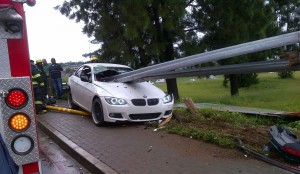Most of us seldom question whether or not the items we buy regularly are risk-free. Unfortunately, many consumer goods are incorrectly designed, manufactured, or marketed. These blunders might result in serious harm or […]
A guardrail’s main purpose is to protect drivers. Guardrails are installed on highways across the country, and most of the time they do a great job at absorbing impact as well as decreasing a car’s momentum ensuring that the severity of an auto accident is mitigated. Now, a whistleblower has alleged the Trinity Industries Inc., the maker of the guardrails, changed the design of its guardrails (reducing their effectiveness) without alerting the relevant authorities.

A recent case brought forward by Mr. Joshua Harman, whose company once produced guardrails, was ruled as a mistrial by the presiding judge who claimed that there were serious concerns when it came to the truthfulness of a witness involved in the case. U.S. District Judge Rodney Gilstrap claims that the witness was intimidated by the defendant, a Mr. Gregg Mitchell, president of Trinity Industries Inc.
The threatened witness is Mr. Dean Sicking, a University of Alabama at Birmingham professor who allegedly claimed that he was told by Mr. Mitchell that he would smear anyone who testified against him. He also added that Mitchell told him he did not expect to see him standing across the courtroom during the trial.
Judge Gilstrap claims that the trial had had challenges from the beginning arising from issues such as inappropriate conduct, gamesmanship and errors. At the same time, some of the evidence which would have provided vital clues in the case was allegedly deleted by individuals who were tied to the case. The judge sanctioned Harman due to his failure to stop the loss of evidence in the form of email communication between him and Trinity, the company at the center of this legal debacle.
Harman and his attorney claim that Trinity Industries quietly changed the design of its guardrails between 2002 and 2005 without alerting the relevant authorities. He says that the new changes resulted in unsafe guardrails - which instead of absorbing impact and shock during accidents, acted as shivs and giant impalers which could pierce a car’s chassis, causing serious injuries and even death to the car’s occupants.
Harman is suing Trinity on behalf of U.S. taxpayers in one of the largest cases involving a transport infrastructure company and a plaintiff. The judge is seeking to set a new trial date when he meets with both parties on August 18th.
Click here to read more on car accidents involving guardrails.
Note: The information that was utilized in this post was gathered from the use of secondary sources. This information used has not been confirmed or independently verified. If you locate any information that is not correct, please contact our firm as soon as possible so that we can make the appropriate corrections. If you find any information that is false, we will remove or correct the post immediately after it is brought to our attention.
Disclaimer: As a valued member of the Dallas community, Rasansky Law Firm’s goal is to improve the safety of all residents in the great state of Texas. These posts should not be viewed as a solicitation for business and the information included herein should not be taken as medical or legal advice. The photos used in this post are not representative of the actual crash scene.
Over 30+ Years Of Personal Injury Experience
Top-Rated and Award-Winning Personal Injury Lawyers
Attorneys Available to Discuss Your Case Now
No Fee Unless You Win
Free Confidential Consultation.
Fill out the form below to receive a free and confidential initial consultation with an experienced personal injury lawyer.